Wesleyan Jeopardy! Contestants Remember Longtime Host Alex Trebek
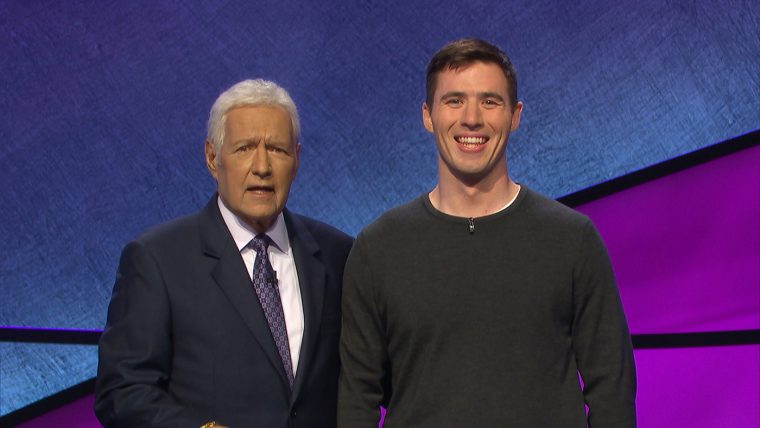
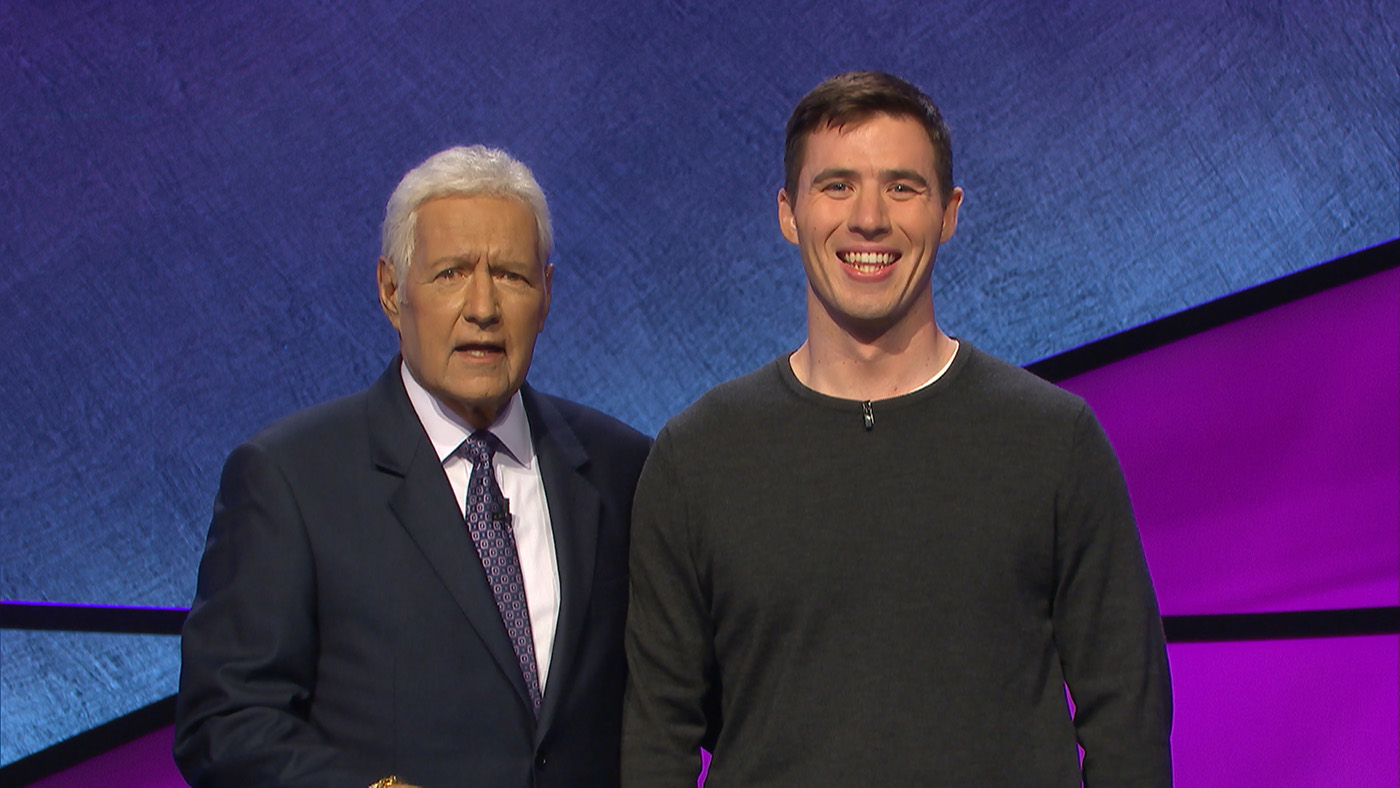
Jeopardy! fans around the world are mourning the passing of longtime host Alex Trebek, who died on Nov. 8 at age 80. According to The New York Times, Trebek had hosted the show consistently since 1984, missing only one episode during that time—on April Fools’ Day in 1997, when he swapped places with the host of Wheel of Fortune as a gag.
Many Wesleyans had the opportunity to compete on Jeopardy! over the years. Below, some reflect on their experiences and share remembrances of Trebek.
J.R. Mannetta ’13 competed on Jeopardy! in January 2020.
When you go on Jeopardy! you don’t actually speak with Alex until the episode is recording and they do your interview segment. Which is my way of saying beyond that conversation I didn’t interact with Alex much. He does do Q&A during commercial breaks and despite obviously not being at 100 percent physically he was still very much with it mentally. He still had a very quick wit and is bitingly funny.
I watched Jeopardy! religiously from high school to now and I can’t fathom what the show will look like without him.
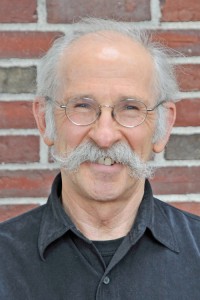
Erhard Konerding MALS ’82 retired as a documents librarian in Wesleyan’s Olin Library in 2015. He joined the University staff in 1972 and earned an MALS from Wesleyan in 1982. He was on the show in May 1994.
Contestants now take an online test to qualify, but back in the 1990s you would go to one of Merv Griffin’s casinos in Atlantic City and take a 10-question test. If you got enough questions right—I think it was seven or eight—they’d ask you back for a 50-question test and then for an audition. I went down to Atlantic City several times to take those tests. One day, I was sitting in the Star and Crescent at Alpha Delt and the phone rang. They asked me to come out to Hollywood and record the show.
When you film Jeopardy!, you show up at the studio in the morning with two changes of clothes. I was able to sit in the audience and watch until it was my turn. That first night, I was in second place going into the final question, and was able to bet strategically to end the night in first place. The second night, I was in second place but the third-place person was close behind me. I was doing the math frantically, and they finally said, “Erhard, we need a number from you.” My Jeopardy! career ended that night, but I won a trip to Hawaii.
The contestant coordinators who run that show were very professional and very compassionate. They said, “You have a good time. Don’t throw up, don’t faint, don’t be scared. You’ll never do this again in your life, so go out and enjoy yourself.”
Partway through the show, Alex Trebek interviews the contestants about topics they provide in advance. He complimented my mustache. I thought that was nice, because he had a mustache too at the time. I had been an artist model for a guy who did Civil War paintings, and Trebek asked me about that. He asked if I ever portrayed anyone famous, and I mentioned a minor general whom nobody’s ever heard of. They ended up cutting that portion from the show.
Trebek was a professional in every sense of the word. As a host, he was never at a loss for words. He was very kind to people. He had a good sense of humor.
My spouse and I are still Jeopardy! junkies. We watch the show, and there are some times when all three contestants stand there with blank looks and we both know the answer simultaneously. We think, “We’d eat these people alive.” But you only get to go on Jeopardy! once.
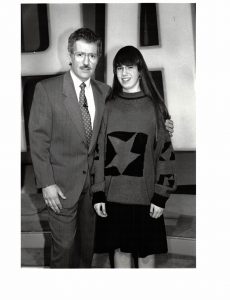
Julie Knauer ’95 competed in the 1991 Jeopardy! Teen Tournament at age 17, in the middle of applying to Wesleyan. By the time the show aired, she had been accepted to Wesleyan during Early Decision 2.
When I was on Jeopardy! as a teenager, I thought Alex Trebek was uptight and perfectionistic. I resented having to act in retakes on the occasions he didn’t enunciate a word precisely right or there were other hiccups that made Alex request a redo. As an adult, I appreciate how amazingly few those instances were over the four games we recorded together—how quick on his feet and mentally nimble he really was. I realize now that Alex was a consummate professional and a steadfast beacon of decency and reason who will be very missed by millions. And I realize 17-year-old me had a lot to learn. Thankfully, Wesleyan helped with that.
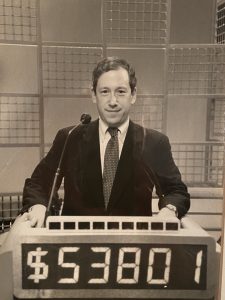
Seth Davis ’72 appeared on Jeopardy! in September 1991. He credits his presence on the show to his lifelong friend and Wesleyan classmate, Steven Berman ’72, who competed on the show a year or two prior. He urged Davis to try out, got him the audition appointment, and sat through all of his tapings.
They shoot five shows every day, but the first day I was there they were behind schedule, so they shot SIX shows. I was on the sixth, and after sitting there all day long watching the other games I was totally keyed up. When Alex came onto the stage he looked the contestants in the eye. When his eyes (they were very blue) met mine I instantly felt comforted. Here was the guy whom I have been watching for years, and with whom I had been training for my appearances for months. I knew then that all would be well.
That is the role a game show host plays, and Alex Trebek was the consummate host. He was only allowed to speak to contestants on the set itself, but he managed to make those short encounters memorable. And since I was on for five games, I had more of those encounters than most contestants. After each show, he would stand next to the winner and we would chat while the credits were rolling. I got so used to that that even after losing the fifth game when I was standing further away from him, I still had my chat with Alex.
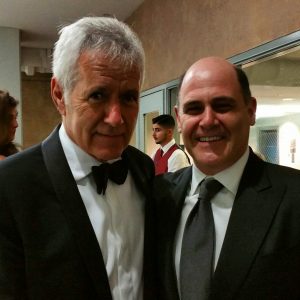
And that last chat is the one I remember best. I thanked him for all he had done to make my time on the show so wonderful. “No,” he responded, “Thank YOU!” The contestants, he often said, were the true “stars” of Jeopardy!
No one who has had the dubious honor of having Alex look you in the eyes and say “Ohhhh… I’m sorry…” after you gave an incorrect answer can ever forget him. And what you can’t see just from watching the shows on TV is that he worked very hard to keep the audience engaged during the many technical delays. And he was constantly making jokes and keeping the atmosphere as pleasant as possible.The question I most often got after being on Jeopardy! was “What is Alex Trebek really like?” I am happy to say, for one last time: he was absolutely wonderful.
Matthew Weiner ’87, P ’18, ’23 competed on the show in 1992, and later played for charity on Celebrity Jeopardy! in 2016.
“I remember Trebek as gracious, funny, and everything you’d want him to be,” Weiner said.
Jon Lindsey ’72 was a Jeopardy! contestant in 1985.
My modest claim to fame during the contestant interview portion of the show was that I had recently been mistaken for the host of Jeopardy! Clearly, the adoring fan had not been wearing her glasses at the time, but it gave us something to chat about. Alex even came over to stand next to me so that the audience could compare and contrast.
Final Jeopardy that day: Recent History. The answer: Total number of men who have been U.S. president during the current British monarch’s rule.
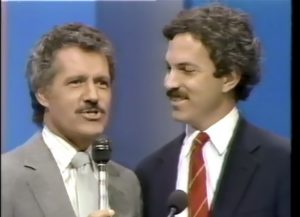
As the credits rolled after our responses and final wagers were revealed, Alex asked how we had arrived at those responses. I explained that for some reason I recalled that Queen Elizabeth had been crowned queen in 1953 and I counted from Eisenhower to Reagan (then president). “What is seven?”
The very nice grad student next to me explained that he thought she had been crowned queen in 1947 (which she had not) but he also started counting with Franklin Roosevelt (by then, dead for two years). But because he had neglected to include Gerald Ford, he ended up with “What is eight?” as his response.
It turns out when the Brits say, “The king is dead, long live the king,” they aren’t kidding. Even though she was indeed crowned queen in 1953, Elizabeth became the queen the moment her father died in 1952 in the last days of the Truman administration. Thus the winning response was, “What is eight?”
Alex was very kind in that moment, noting that it was a tricky final, and gave me an 8×10 glossy headshot autographed, “To my look-alike.” He was a good man, and he asked all the right questions for 36 years and more. We will miss him.
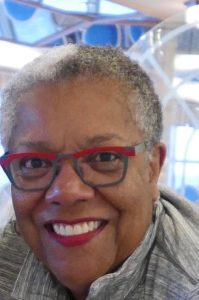
Gayle Pemberton, professor of English and African American Studies, emerita
It was a very singular experience appearing on Jeopardy!. When I told Alex where I had taught, he asked me if I had problems keeping a job! All in fun, as I had already taught at a number of colleges. He also commented on my Final Jeopardy wager, which would have kept me from winning. I didn’t win the game, but I ended with a nice sum, had one other person not ended with more!
I would have won had I answered a musical daily double. I wagered everything, because I know a lot of music. But, I didn’t know a lot of country music, and wouldn’t you know it—a country music answer.
It was freezing on the soundstage, and I was happy I had worn a sweater.
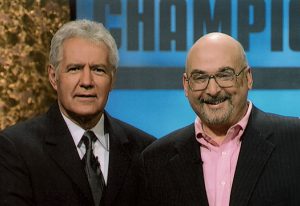
By coincidence, Steve Berman ’72 and Jay Wish ’71 competed against one another on Jeopardy! in the fall of 1989. Below, Wish recounts his experience on the show.
I remember Alex as being as gracious to the contestants off-camera as he was on-camera. As you know, Alex comes over to chat with the contestants on-camera at the end of the show while the credits are rolling. Since I was champion the first day I enjoyed the benefit of Alex’s primary attention at the end of the show, during which time he told me he had a kidney stone because he was aware that I’m a nephrologist. He has a very good memory of contestants, and even recalled that one of the finalists in the college tournament the prior year was from the same university where I was a member of the faculty. Based on my limited personal interaction with Alex, I can confirm that he was a very classy guy and not a celebrity who had allowed his fame to go to his head. I can’t imagine how they’ll be able to replace him on Jeopardy!.

